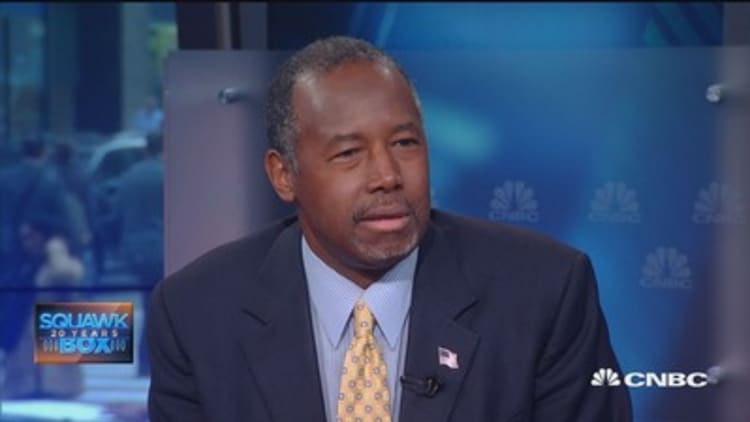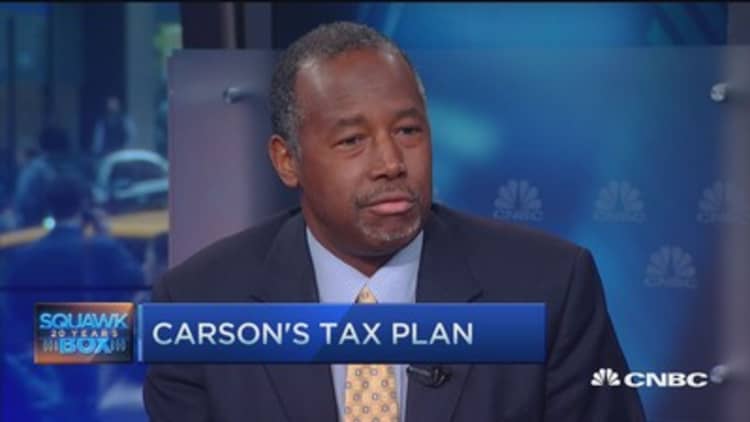


GOP presidential hopeful Ben Carson said Wednesday he would declare a six-month tax hiatus for corporations to bring the more than $2 trillion in profits held overseas back to the United States.
"However, I would stipulate that 10 percent of it had to be used in enterprise zones [impoverished areas] that we'd set up in some of our major cities or to create jobs for people who are unemployed and on welfare," the retired neurosurgeon told CNBC's "Squawk Box."
"You want to talk about stimulus," he continued, "that would probably be the biggest stimulus since the New Deal and FDR. And it wouldn't cost the taxpayers a single penny."
But once the six-month tax holiday ends, U.S. corporate taxes need to be re-established at a level lower than the average around the world, he said. "I want us to become a tax haven for people because it also becomes an opportunity haven for people."
The U.S. has a net effective corporate tax rate of about 40 percent, compared to the global average of nearly 23.7 percent, according to KPMG.
Read MoreHow tax reform could shape the GOP field
On personal income taxes, Carson said he's calling for a 10 percent flat tax. "I use 10 percent because it's easy to do the numbers."
"You make $10 billion you pay a billion. You make 10 you pay one, and you get exactly the same rights and privileges," he continued. "You have to remove all the loopholes, all the deductions."
Carson, who grew up poor in a single-parent household in Detroit, said the rich should not be taxed more than those less fortunate, and all lower-income people need to pay into the system. "The principal I'm espousing is complete fairness," he said.
In the latest RealClear Politics polling aggregator, Carson was second with 17.2 percent support to Donald Trump's 23.2 percent.
Former Hewlett-Packard CEO Carly Fiorina's was in third at 10.4 percent.
Sen. Marco Rubio of Florida and ex-Florida Gov. Jeb Bush were fourth and fifth at 9.9 percent and 8.4 percent, respectively.
Carson said his support comes from a cross-section of Americans, including young people.
"When we have rallies, I see huge numbers of millennials ... [and] I know that they don't agree with me on [social issues]," he acknowledged. As a social conservative, for example, he defines marriage as between a man and a woman and he's anti-abortion.
But he said, "[Millennials] do understand that there's somebody who's looking out for their future and understands the economic implications of our fiscal irresponsibility."
On free trade, Carson said he'd like to see the newly signed Trans-Pacific Partnership (TPP) renegotiated "because right now we have a lot of special interest groups who benefit."
"[But] I certainly believe in free trade," he said, adding "there are aspects [of TPP] that are reasonable."
The next step for the trade agreement in the U.S. is ratification by Congress, where Democrats oppose it and many Republicans, who had pushed through President Barack Obama's request earlier this year for "fast track" negotiating authority, are wavering.
Addressing regulations, Carson said he's not opposed to all of them. "We obviously need appropriate regulatory oversight in our country."
But he added: "All of these policies that the current administration utilizes demonstrates a distinct lack of understanding of economics."
"I believe we need to run our government like we run an efficient business."
"We have 4.1 million federal employees. That is absurd. You need to reduce that by attrition. We can get it down in three or four years to a reasonable level."
"There are 645 government agencies and sub-agencies, all of which have budgets. We need to across the board have them cut those budgets."


